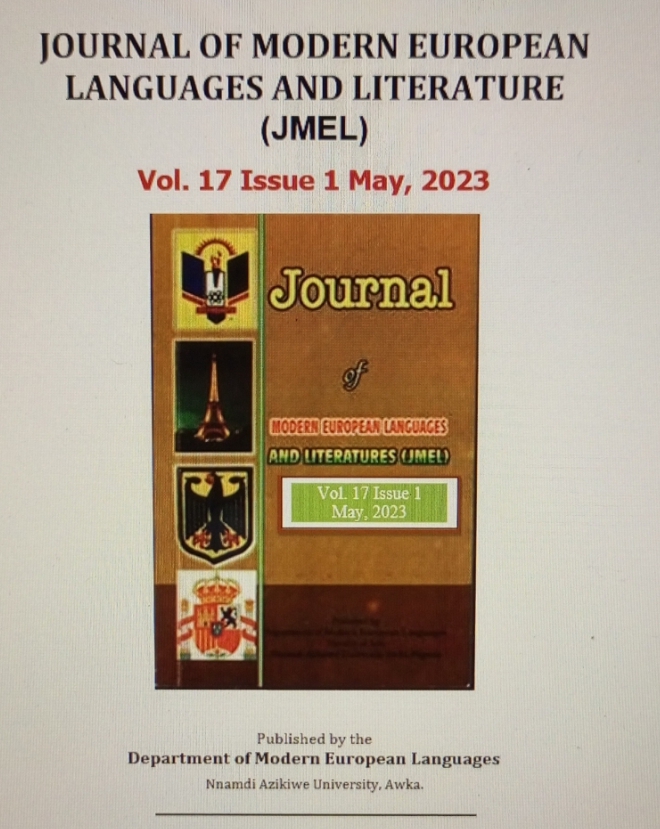A CONTRASTIVE ANALYSIS OF THE SYNTAX OF GERMAN AND IGBO ADJECTIVES
Keywords:
Contrastive analysis, syntax, German, Igbo adjectives, analyse contrastive, syntaxe, adjectifs allemand et IgboAbstract
Learning a foreign language, among other things, expands one’s view of the world, deepens his connection to other cultures and even grows the person’s brain as a bilingual. On this account, the topic of study here is “A Contrastive Analysis of the Syntax of German and Igbo Adjectives”. The objectives of the study are to discover the syntactic similarities and differences of German
and Igbo adjectives, carry out their syntactic analysis with the view to facilitating the teaching of German adjectives to Igbo learners. The method of study is descriptive. The theory for the study is the Theory of Contrastive Analysis. As findings, the study has established that adjectives are parts of speech that describe or modify nouns or pronouns. Also established is that German has
three main types of adjectives—the Predicative, Adverbial and Attributive, whereas the Igbo language has two main types –the Lexical and Phrasal (Clausal) adjectives. In terms of similarities, the basic German and Igbo sentence order is SVO and an adjective is a part of speech in both languages, in addition to existing in types and having a noun or pronoun as their subject of description. Difference wise, in Igbo, it is the syntactic position of a word that
determines whether it is an adjective or not, unlike German.
Résumé
Apprendre une langue étrangère, entre autres choses, élargit la vision du monde, approfondit le lien avec d'autres cultures et développe même le cerveau de la personne en tant que bilingue. A ce titre, le sujet d'étudede cette communication est "Une analyse contrastive de la syntaxe des adjectifs allemands et igbo". Les objectifs de l'étude sont de découvrir les similitudes et les différences syntaxiques des adjectifs allemands et igbo, de procéder à leur analyse syntaxique en vue de faciliter l'enseignement des adjectifs allemands aux apprenants igbo. La méthode d'étude est descriptive. La théorie de l'étude est la théorie de l'analyse contrastive. Comme résultats, l'étude a établi, entre autres, que les adjectifs sont des parties du discours qui décrivent ou modifient des noms ou des pronoms. Il est également établi que l'Allemand a trois principaux types d'adjectifs - le prédicatif, l'adverbial et l'attributif, alors que la langue Igbo a deux types principaux - les adjectifs lexicaux et phrasaux (clausal). En termes de similitudes, l'ordre de base des phrases en Allemand et en Igbo est SVO et un adjectif fait partie du discours dans les deux langues,
en plus d'exister dans les types et d'avoir un nom ou un pronom comme sujet de description, ils se différencient du fait qu’en Igbo, c'est la position syntaxique d'un mot qui détermine s'il s'agit d'un adjectif ou non, contrairement à l’Allemand.

